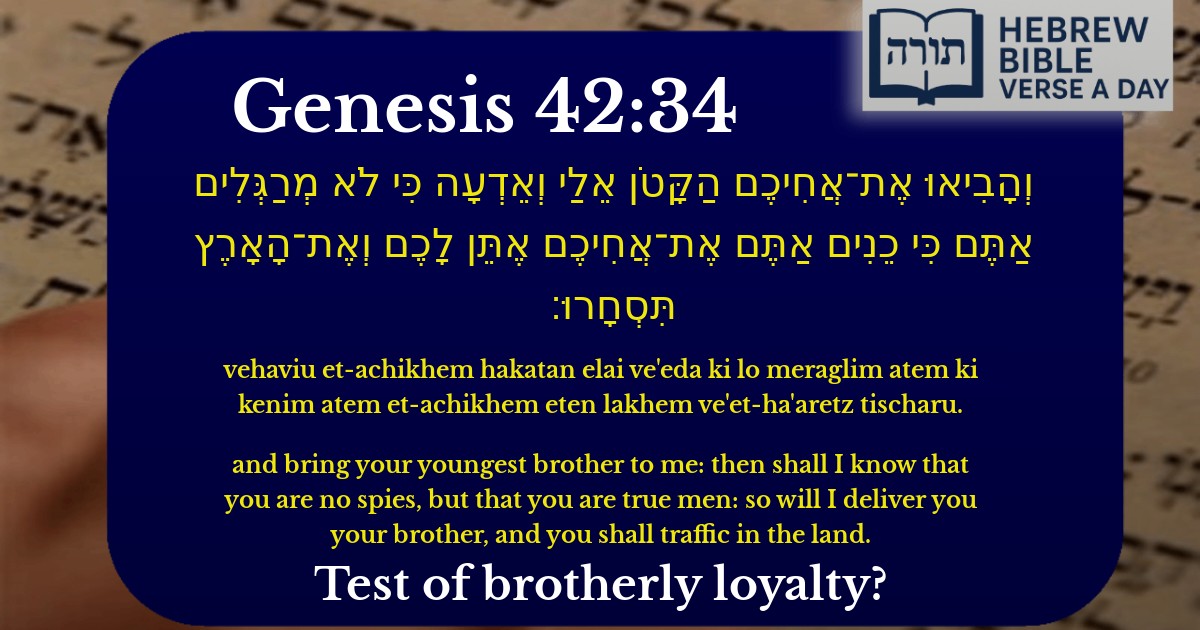Join Our Newsletter To Be Informed When New Videos Are Posted
Join the thousands of fellow Studends who rely on our videos to learn how to read the bible in Hebrew for free!
Hebrew Text
וְהָבִיאוּ אֶת־אֲחִיכֶם הַקָּטֹן אֵלַי וְאֵדְעָה כִּי לֹא מְרַגְּלִים אַתֶּם כִּי כֵנִים אַתֶּם אֶת־אֲחִיכֶם אֶתֵּן לָכֶם וְאֶת־הָאָרֶץ תִּסְחָרוּ׃
English Translation
and bring your youngest brother to me: then shall I know that you are no spies, but that you are true men: so will I deliver you your brother, and you shall traffic in the land.
Transliteration
Vehaviu et-achikhem hakatan elai ve'eda ki lo meraglim atem ki kenim atem et-achikhem eten lakhem ve'et-ha'aretz tischaru.
Hebrew Leining Text
וְ֠הָבִ֠יאוּ אֶת־אֲחִיכֶ֣ם הַקָּטֹן֮ אֵלַי֒ וְאֵֽדְעָ֗ה כִּ֣י לֹ֤א מְרַגְּלִים֙ אַתֶּ֔ם כִּ֥י כֵנִ֖ים אַתֶּ֑ם אֶת־אֲחִיכֶם֙ אֶתֵּ֣ן לָכֶ֔ם וְאֶת־הָאָ֖רֶץ תִּסְחָֽרוּ׃
וְ֠הָבִ֠יאוּ אֶת־אֲחִיכֶ֣ם הַקָּטֹן֮ אֵלַי֒ וְאֵֽדְעָ֗ה כִּ֣י לֹ֤א מְרַגְּלִים֙ אַתֶּ֔ם כִּ֥י כֵנִ֖ים אַתֶּ֑ם אֶת־אֲחִיכֶם֙ אֶתֵּ֣ן לָכֶ֔ם וְאֶת־הָאָ֖רֶץ תִּסְחָֽרוּ׃
🎵 Listen to leining
Parasha Commentary
📚 Talmud Citations
This verse is not quoted in the Talmud.


Context in the Story of Yosef and His Brothers
This verse (Bereshit 42:34) is part of the narrative where Yosef, now the viceroy of Egypt, tests his brothers by accusing them of being spies. He demands that they bring their youngest brother, Binyamin, to prove their honesty. Rashi explains that Yosef's intention was to see whether the brothers would display the same jealousy and hatred toward Binyamin (Rachel's other son) as they had toward him.
Yosef's Conditions for Trust
The phrase "וְאֵדְעָה כִּי לֹא מְרַגְּלִים אַתֶּם" ("then shall I know that you are no spies") reflects Yosef's strategy to verify their claim. The Ramban notes that Yosef's demand was reasonable—since a spy would not have family ties in the land he is scouting, bringing Binyamin would confirm their story. The Sforno adds that Yosef sought to test their unity and familial loyalty.
The Promise of Brotherhood and Trade
Yosef's assurance "אֶת־אֲחִיכֶם אֶתֵּן לָכֶם" ("I will deliver you your brother") refers to Shimon, whom he had detained (Bereshit 42:24). The Midrash Tanchuma suggests that Yosef wanted to see if they would return for Shimon, demonstrating their commitment to each other. The offer "וְאֶת־הָאָרֶץ תִּסְחָרוּ" ("you shall traffic in the land") indicates permission to trade freely, which Ibn Ezra interprets as a gesture of goodwill to alleviate their suspicions.
Lessons in Accountability and Repentance
The Or HaChaim highlights that Yosef's test was also a means for the brothers to rectify their past sin of selling him. By forcing them to protect Binyamin (who, like Yosef, was Rachel's son), they would confront their earlier cruelty. The Kli Yakar emphasizes that this episode begins their teshuvah (repentance) process, as they later express remorse over Yosef's fate (Bereshit 42:21-22).